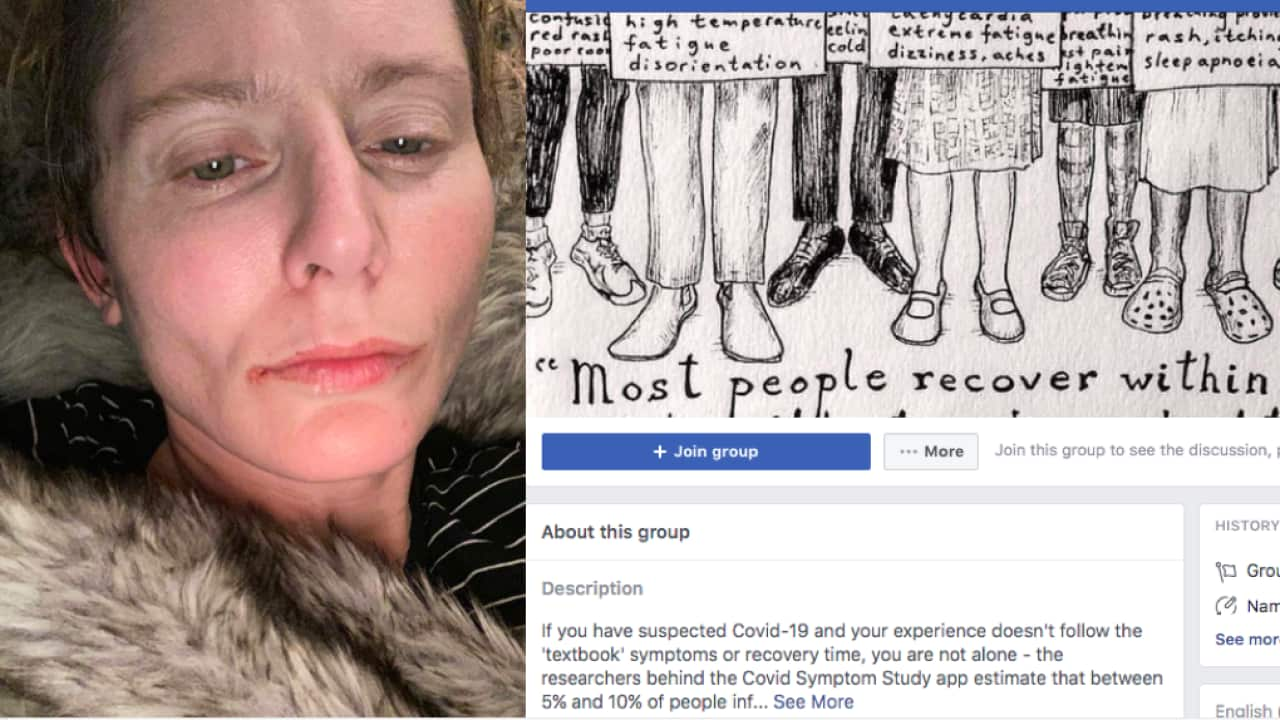Several health experts are warning the long-term impacts of COVID-19 could further burden the country's health system, and leave many Australians with possibly debilitating side effects.
As parts of the world continue to grapple with outbreaks of the highly contagious Delta variant, harder-hit countries such as the UK and as more evidence emerges.
In February last year, the that people with mild cases of COVID-19 should usually recover within two weeks.
But a said some ten per cent of people still experience persistent ill health 12 weeks after having their initial infection, in what is being referred to as 'long COVID' or post-COVID conditions.
One study in the UK suggests that number is , while a recent review of COVID-19 data from 45 studies by the Stanford University School of Medicine in the US says it's
"It's much more prevalent than one would expect," Dr Stuart Tan, a Sydney physician in trauma and rehabilitation told SBS News.
Dr Tan is among the Australian researchers who are attempting to understand the long-term impacts of COVID-19 among a smaller cohort of cases.
While the current priority is on preventing infection and encouraging vaccination, particularly amid a worsening outbreak in New South Wales, they believe 'long COVID' also warrants attention to prepare the healthcare system and ensure adequate supports.
"I think it's crucial to stress the importance of preventing infection, obviously not just for the acute reasons but also the long-term effects. That applies to both older people and to younger people as well," the University of NSW's Professor Bette Liu told SBS News.
What is 'long COVID'?
'Long COVID' is a complex and rapidly evolving field for which there is no clear definition. But researchers agree it encapsulates those who do not recover from acute COVID-19 infection and go on to have persistent symptoms.
"The actual term long COVID is a name being coined by people who are affected by COVID-19. I think it has been a condition that is quite hard to define, which has made it difficult to properly study," Professor Liu said.
She is the lead author of the largest study of COVID-19 recovery undertaken so far in Australia which systematically tracked 2,904 people (or 94 per cent) of those diagnosed with the virus in NSW during the state's 'first wave' last year.
The whole-of-population study found five per cent of diagnoses were still experiencing symptoms three months later. Professor Liu said women, the elderly and those with pre-existing health problems were less likely to recover, with the most commonly reported symptoms being cough and fatigue.
Professor Liu said people also report headaches, continuing problems with taste and smell, chest pain and rashes along with more "difficult to explain" symptoms.
"Our study suggested lower proportions of people ending up with long-term symptoms of COVID-19 then some international studies suggesting higher numbers," she said.
"But when you think about the size of the pandemic overall, even when you're talking about five per cent of people in Australia where we've had this extremely contained pandemic (at least to this point), you're still talking about thousands of people who potentially have long-term side effects."
She said 'long COVID' presents in different scenarios, including those who are hospitalised during their initial infection and end up in intensive care who may have a long recovery. But, she added, those who experience a mild infection may also go on to have prolonged symptoms.
"Whether it's one syndrome, or whether it's due to one issue or a variety of different things going on needs to be better understood," she said.
Dr Tan is the lead investigator of a separate study run by the Illawarra Shoalhaven Local Health District in Sydney that has been recruiting COVID-positive patients since last May.
He stressed recovery from COVID-19 can also impact a person's mental health.
"We need to recognise that COVID-19 is not like the flu. There are long-term implications, the recovery journey can be a long one and it can impact your quality of life even if you are not hospitalised," he said.
'Long COVID' has also cast a spotlight on the experience of those with myalgic encephalitis, often referred to as chronic fatigue syndrome (ME/CFS), with some researchers and patients noting a similarity of some symptoms.
Professor Martin Hensher, from Deakin University's Institute for Health Transformation, said the most direct link is common symptoms of fatigue and debilitation, and associated mental health impacts.
He said patients with 'long COVID', like those with ME/CFS, are reporting concerns health professionals are not taking their conditions seriously.
"Certainly, people who suffer with ME/CFS often report they're shuffled off with the implication it's all in their minds," he told SBS News.
'What we are seeing - not necessarily in Australia because our numbers of COVID-19 patients are so low, but certainly in the UK and Europe - is that many people with 'long COVID" are reporting they are having quite similar experiences.
"They believe they are quite debilitated and disabled by this, but their GPs and sometimes specialists are not taking them seriously, and are often limited in what they can do for them."
Professor Hensher said learning how to support 'long COVID' patients will be a "difficult yet important challenge" that can draw from the experiences of the ME/CFS community.
'It would be wise to be thinking about this now'
Professor Hensher argues while primary prevention is currently the number one priority for Australia, "it would be wise to be thinking now" about the longer term consequences of the virus.
"The most important think we can do for 'long COVID' in Australia is to prevent it by preventing COVID-19 in the first place - and that's all the things we understand: vaccination, and all the other public health measure that we are all too familiar with," he said.
He says the bottom line is "we've really only been focusing on deaths".
"But in fact, quite a significant number of people end up really quite debilitated and quite sick with 'long COVID' for a long time. That changes some of our risk-benefit ratios and that hasn't been properly reflected in the planning [from the rest of the world] yet, and we need to be thinking about that.
"People are doing incredibly difficult jobs and people in these systems have been working incredibly hard for a year and a half now...I think one lesson we need to take is that you do have to invest, and get some people working on something slightly over the horizon, and get them working on it now."
Dr Tan agrees that while the focus has been on controlling the pandemic, understanding the long-term impacts will become more important as COVID-related deaths decrease with increased vaccination - as has been seen overseas - and infections remain high.
But he stressed Australia is in "very early days".
'There's definitely, from a medical perspective, a need that we identified in our study and that should be addressed in due course," he said.
Professor Liu said thinking about long-term effects is important "both now, and in long-term planning".
"In the first place, we want to prevent disease... but if people end up with the disease, we also need to be prepared to understand that disease, what the consequences are for individuals and think about how we can try to support them."
Amie Morris, who was among the first Australians to be diagnosed with COVID-19 last February, also called on the government to consider supporting those with long-term symptoms moving forward.
Ms Morris, 39, after her acute infection. At the start of this year, she developed bruising, mostly on her legs. She says doctors have been unable to provide any answers. "I'm a bit scared because I don't know if anything else will pop up and no one can really tell you, because they don't know," she told SBS News. "This is all external stuff; I don't know what's going on inside. So, I'm just hoping for the best, really."
"I'm a bit scared because I don't know if anything else will pop up and no one can really tell you, because they don't know," she told SBS News. "This is all external stuff; I don't know what's going on inside. So, I'm just hoping for the best, really."

Amie Morris was diagnosed with COVID-19 last February. Source: Supplied
Ms Morris said her symptoms, while cosmetic, will impact her life.
"I've heard a lot of people who have had ongoing brain fog, they can't concentrate or think the same... I think it's definitely something the government will have to consider moving forward."
What might this look like?
Earlier this week, to qualify serious long-term symptoms of COVID-19 could as a form of disability, making federal protections and resources available to those sufferers.
"Many Americans who seemingly recovered from the virus still face lingering challenges like breathing problems, brain fog, chronic pain or fatigue," Mr Biden said. "These conditions can sometimes rise to the level of a disability."
He said US agencies will coordinate to ensure those people are protected after the end of their infections.
Professor Hensher said it is a "timely and sensible" proposal, noting the potential huge burden of long COVID in the US where . "There is some group of people whose long COVID does not go away in whom I think that, unquestionably, at some point you have to recognise that this has become a debilitating and disabling illness and that therefore yes, they do need to qualify in various ways from that," he said.
"There is some group of people whose long COVID does not go away in whom I think that, unquestionably, at some point you have to recognise that this has become a debilitating and disabling illness and that therefore yes, they do need to qualify in various ways from that," he said.

US President Joe Biden Source: Getty Images
People with Disability Australia, the country's peak advocacy body, welcomed Mr Biden's proposal in principal but said the two country's disability systems are vastly different.
"The principal that those who are experiencing long-term effects that become disabling as a result of 'long COVID" is absolutely something that we support," PWDA's Giancarlo de Vera told SBS News.
"But the two systems are very different - Australia has a set of systems that are much more accommodating than America's. We'd be interested to know what the detail was."
Mr de Vera said Australia would need to see improved accessibility in mainstream service systems for those who cannot access the National Disability Insurance Scheme (NDIS).
"The NDIS is a very particular scheme for those with lifelong and permanent disabilities. However there is a second tier of people with disability who access mainstream services that we all access," he said.
"To some degree, we can expect those with symptoms of 'long COVID' will, depending on their symptoms, be episodic in nature. So those people would need to access support from mainstream health systems.
"It's encumbent upon the state and territory governments [who deliver them] to ensure those sytems are absolutely accessible, particularly for those who don't meet the high threshold the NDIS requires for access."
Separately, the UK has been setting up specialised 'long COVID' clinics,
Professor Hensher said while Australia is not yet seeing the same level of burden that requires specialised centres, it should work towards coordinated healthcare.
In , he recommended a national centre for post-COVID care be established in Australia to pull together guidelines and support for public health systems.
"I'm not aware, nationally but also at a state and territory level, of systematic attempts to try and plan and design service responses for 'long COVID'," he said.
The Department of Health has been contacted for comment.
Meanwhile, researchers will continue to recruit and follow patients to understand the scope of 'long COVID'. Dr Tan encouraged any Australians diagnosed with the Delta variant in particular




